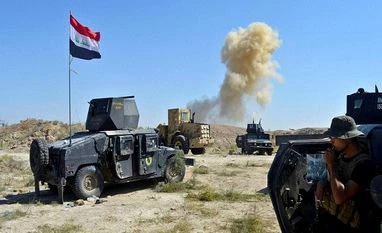Iraqi forces raised the national flag over the government compound in Fallujah today, top commanders said, a breakthrough in the nearly four-week-old offensive against the Islamic State group's bastion.
Prime Minister Haider al-Abadi went on state television to announce that his forces were in control of the city except for a few small pockets of jihadists.
They met limited resistance from ISIS fighters, who were fleeing the city, the commanders told AFP, leaving the organisation on the brink of losing one of the most emblematic strongholds in its two-year-old "caliphate".
"We promised you the liberation of Fallujah and we retook it. Our security forces control the city except for small pockets that need to be cleared within the coming hours," Abadi said.
Military commanders explained that the forces had raised the flag over the government compound in the centre of the city.
"The liberation of the government compound, which is the main landmark in the city, symbolises the restoration of the state's authority in Fallujah," federal police chief Raed Shaker Jawdat told AFP.
The overall commander of the operation, Lieutenant General Abdulwahab al-Saadi, said that Iraqi forces have now liberated 70% of the city.
Significant parts of northern Fallujah, where thousands of civilians are believed to remain, have yet to be retaken.
In December 2015, Abadi announced the liberation of Ramadi, the capital of Anbar province where Fallujah lies, but it took several more weeks of fighting to establish full control.
In the deserted, recently reconquered neighbourhoods of the insurgent bastion known in Iraq as the "City of Mosques", elite forces were consolidating positions, stocking up on food and weapons.
Dozens of bodies of dead ISIS fighters were left to rot under blankets amid the rubble of homes destroyed by air strikes, rockets or controlled explosions of the hundreds of bombs the jihadists themselves laid across the city.
Fallujah, just 50 kilometres (30 miles) west of Baghdad, is one of ISIS's key historical bastions and its loss would leave Mosul as the only major Iraqi city under its control.
Prime Minister Haider al-Abadi went on state television to announce that his forces were in control of the city except for a few small pockets of jihadists.
They met limited resistance from ISIS fighters, who were fleeing the city, the commanders told AFP, leaving the organisation on the brink of losing one of the most emblematic strongholds in its two-year-old "caliphate".
Also Read
It is the latest setback for the jihadists who have also lost territory in neighbouring Syria and in Libya in recent weeks.
"We promised you the liberation of Fallujah and we retook it. Our security forces control the city except for small pockets that need to be cleared within the coming hours," Abadi said.
Military commanders explained that the forces had raised the flag over the government compound in the centre of the city.
"The liberation of the government compound, which is the main landmark in the city, symbolises the restoration of the state's authority in Fallujah," federal police chief Raed Shaker Jawdat told AFP.
The overall commander of the operation, Lieutenant General Abdulwahab al-Saadi, said that Iraqi forces have now liberated 70% of the city.
Significant parts of northern Fallujah, where thousands of civilians are believed to remain, have yet to be retaken.
In December 2015, Abadi announced the liberation of Ramadi, the capital of Anbar province where Fallujah lies, but it took several more weeks of fighting to establish full control.
In the deserted, recently reconquered neighbourhoods of the insurgent bastion known in Iraq as the "City of Mosques", elite forces were consolidating positions, stocking up on food and weapons.
Dozens of bodies of dead ISIS fighters were left to rot under blankets amid the rubble of homes destroyed by air strikes, rockets or controlled explosions of the hundreds of bombs the jihadists themselves laid across the city.
Fallujah, just 50 kilometres (30 miles) west of Baghdad, is one of ISIS's key historical bastions and its loss would leave Mosul as the only major Iraqi city under its control.
)